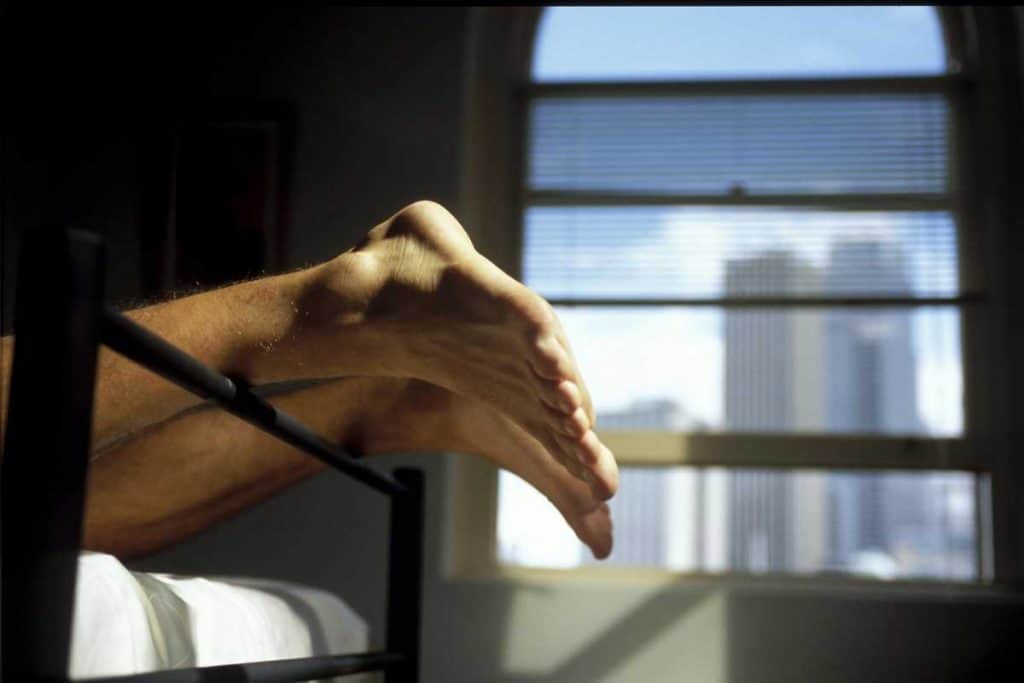
Restless legs syndrome (RLS) is a condition that causes people an urge to move their legs. Psychology Today Australia reports that around 2 to 7 percent of the population is diagnosed with this disorder. Women are more likely to catch this condition and it interfered highly with their sleep. So, what is restless legs syndrome and how it affects sleep?

What is Restless Legs Syndrome and its effects to sleep?
Also known as Willis-Ekbom Disease, RSL is the sensations in the legs causing an urge for people to move them. It often starts in the evenings, especially near resting hours when the person is sitting or lying down in bed.
It can also occur in the daytime when someone is at rest, like lying down or sitting for long periods of time. The symptoms of the disorder can be severe at night and could cause sleeplessness. While it’s generally considered as a sleep disorder, the condition is actually a neurological condition.
People with RSL reported that they have periodic limb movement which causes the leg to involuntarily jerk when sleeping. The legs tend to twitch every 15 to 40 seconds throughout the night. This disrupts their sleep and causes daytime exhaustion and lethargy.
Restless Legs Syndrome symptoms
The symptoms of RSL can be mild to severely disturbing. People suffering from the condition have itchy sensations and an overwhelming urge to move their legs.
- Itchy, creepy feeling, with pins and needles
- Involuntary urge to move the legs
- Leg twisting and jerking
The symptoms often trigger when the person is at rest, like when sitting, lying down, or simply lounging in. What’s more, it gets worse at night when you’re fully at rest.
They can come and go depending on lifestyle changes, but it can cause enough turmoil for your nightly sleep.
Causes of Restless Legs Syndrome
Most cases of RLS are unknown, but most experts suspected that genes played an important role in the cause of RSL. Other factors that led to the condition are:
- Low iron deficiency in the brain
- Medications, especially antidepressants
- Nerve damage
- Conditions like kidney failure, diabetes, and Parkinson’s disease
- Last trimester of pregnancy
- Sleep apnea
- Increase in age and weak muscles
Some chronic diseases like hemodialysis or renal issues might increase the likelihood of RSL.

Treatment for Restless Legs Syndrome
While there is no known cure for RSL, there are various treatments for each cause of restless legs syndrome. Medications are provided for the patient’s symptoms and conditions. Treatments can be temporary or long-lasting depending on the patient’s lifestyle changes.
Intake of B-Vitamins
B vitamins are taken to prevent nerve damages and improve the nervous system. It can help lessen the tingly and itchy feelings when jerking your legs. Good food sources of vitamin B are bananas, citrus fruits, broccoli, sunflower seeds, milk, and cheese.
Increase iron consumption
Severe iron deficiency can cause damage to the brain and nerves. It can even lead to brain atrophy where the lack of iron causes loss of control, coordination, tremors, jerking, or fatigue. While iron supplements are available in all pharmacies, one can get their daily iron in milk, nuts, green leafy vegetables, tofu, and beans.
Get moving
Daily activities and leg exercises can lessen symptoms of RSL. By getting enough circulation in the body, the nerves are functioning accordingly. A simple leg exercise or brisk walk can deliver the benefits. People prone to RSL will find marathons or high-intensity interval training (HIIT) likelihood for the condition.
Relax your leg muscles
Massage your legs or get into a warm bath to relax your muscles. You can even apply a hot compress to ease tension or nerve prickling. What’s more, you can add relief to your leg muscles by wearing compression pants, socks, and shorts. Wrapping your legs in bandages can alleviate that itchy feeling. You can also try raising your legs up with a pillow.
Avoid dangerous substances
Drugs, alcohol, and nicotine are known substances that impair blood flow and oxygen circulation. It can further damage your brain and cut off balance and control over your nerves. These substances can worsen RSL symptoms by damaging the central nervous system.
Practice good sleeping habits
You can practice good sleeping habits by doing any of the following:
- Stick to a regular sleep-wake schedule
- Invest in good pillows and mattresses
- Lower the lights when you’re about to sleep
- Put down electronics 30 minutes before sleeping
- Practice bedtime routine like reading, listening to music, or drinking hot milk
- Prop a pillow on your lower back or legs to support you
Seek medical treatment from your doctor
If you’re suffering from restless legs syndrome, you should seek medical advice from your doctor. Remember to ask the side effects of each medication and how you can modify your lifestyle around it. What’s more, time your medications before your symptoms start showing.



